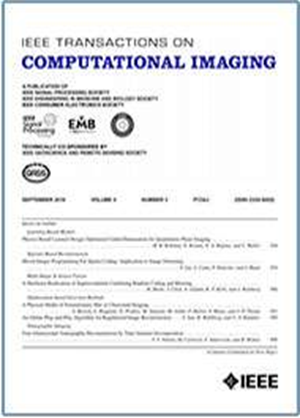Unsupervised Low-Dose CT Reconstruction With One-Way Conditional Normalizing Flows
IF 4.8
2区 计算机科学
Q2 ENGINEERING, ELECTRICAL & ELECTRONIC
引用次数: 0
Abstract
Deep-learning techniques have demonstrated significant potential in low-dose computed tomography (LDCT) reconstruction. Nevertheless, supervised methods are limited by the scarcity of labeled data in clinical scenarios, while CNN-based unsupervised denoising methods often result in excessive smoothing of reconstructed images. Although normalizing flows (NFs) based methods have shown promise in generating detail-rich images and avoiding over-smoothing, they face two key challenges: (1) Existing two-way transformation strategies between noisy images and latent variables, despite leveraging the regularization and generation capabilities of NFs, can lead to detail loss and secondary artifacts; and (2) Training NFs on high-resolution CT images is computationally intensive. While conditional normalizing flows (CNFs) can mitigate computational costs by learning conditional probabilities, current methods rely on labeled data for conditionalization, leaving unsupervised CNF-based LDCT reconstruction an unresolved challenge. To address these issues, we propose a novel unsupervised LDCT iterative reconstruction algorithm based on CNFs. Our approach implements a strict one-way transformation during alternating optimization in the dual spaces, effectively preventing detail loss and secondary artifacts. Additionally, we propose an unsupervised conditionalization strategy, enabling efficient training of CNFs on high-resolution CT images and achieving fast, high-quality unsupervised reconstruction. Experimental results across multiple datasets demonstrate that the proposed method outperforms several state-of-the-art unsupervised methods and even rivals some supervised approaches.单向条件归一化流的无监督低剂量CT重建
深度学习技术在低剂量计算机断层扫描(LDCT)重建中显示出巨大的潜力。然而,有监督的方法受到临床场景中标记数据稀缺的限制,而基于cnn的无监督去噪方法往往导致重构图像过度平滑。尽管基于归一化流(NFs)的方法在生成细节丰富的图像和避免过度平滑方面显示出了希望,但它们面临两个关键挑战:(1)现有的噪声图像和潜在变量之间的双向转换策略,尽管利用了NFs的正则化和生成能力,但可能导致细节丢失和二次伪影;(2)在高分辨率CT图像上训练NFs是计算密集型的。虽然条件归一化流(cnf)可以通过学习条件概率来降低计算成本,但目前的方法依赖于标记数据进行条件化,这使得基于无监督cnf的LDCT重建成为一个未解决的挑战。为了解决这些问题,我们提出了一种新的基于CNFs的无监督LDCT迭代重建算法。我们的方法在对偶空间的交替优化过程中实现了严格的单向转换,有效地防止了细节丢失和二次伪影。此外,我们提出了一种无监督条件化策略,能够在高分辨率CT图像上高效地训练cnf,并实现快速、高质量的无监督重建。跨多个数据集的实验结果表明,该方法优于几种最先进的无监督方法,甚至可以与一些有监督方法相媲美。
本文章由计算机程序翻译,如有差异,请以英文原文为准。
求助全文
约1分钟内获得全文
求助全文
来源期刊

IEEE Transactions on Computational Imaging
Mathematics-Computational Mathematics
CiteScore
8.20
自引率
7.40%
发文量
59
期刊介绍:
The IEEE Transactions on Computational Imaging will publish articles where computation plays an integral role in the image formation process. Papers will cover all areas of computational imaging ranging from fundamental theoretical methods to the latest innovative computational imaging system designs. Topics of interest will include advanced algorithms and mathematical techniques, model-based data inversion, methods for image and signal recovery from sparse and incomplete data, techniques for non-traditional sensing of image data, methods for dynamic information acquisition and extraction from imaging sensors, software and hardware for efficient computation in imaging systems, and highly novel imaging system design.
 求助内容:
求助内容: 应助结果提醒方式:
应助结果提醒方式:


